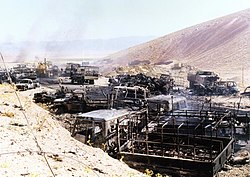Operation Mersad
| Operation Mersad | |||||||||
|---|---|---|---|---|---|---|---|---|---|
| Part of Iran–Iraq War | |||||||||
 Mujahadeen-e-Khalq (MEK) army was destroyed in 1988 |
|||||||||
|
|||||||||
| Belligerents | |||||||||
|
|
|||||||||
| Commanders and leaders | |||||||||
|
|
|||||||||
| Units involved | |||||||||
|
|
|||||||||
| Strength | |||||||||
| 7,000 MEK troops 90,000 Iraqis engaged 900,000 total 300 tanks unknown number of artillery pieces and aircraft |
210,000 Iranians engaged 1,200,000 total 365 tanks unknown number of artillery pieces and aircraft |
||||||||
| Casualties and losses | |||||||||
|
1,500 to 2,506 KIA (Iranian claim) 400 APCs 90 pieces of 80mm mortar 150 pieces of 60mm mortar 30 pieces of 106mm recoilless rifles |
400 KIA (Iranian claim) 55,000 KIA and WIA (MEK claim) |
||||||||
Decisive Iranian victory
End of the Iran–Iraq War
1,500 to 2,506 KIA (Iranian claim)
1,263 KIA, WIA, MIA, POW (MEK claim)
2,000 KIA (independent estimate)
several thousand hanged for treason
Operation Mersad (Persian: عملیات مرصاد, meaning "ambush") was the last major military operation of the Iran–Iraq War, ending in a decisive victory for Iran. The operation involved a successful counterattack against a July 1988 military incursion from Iraq, by a military force of about 7,000 members of the Mujahadeen-e-Khalq (MEK). The MEK soldiers were armed, equipped and given air support by Iraq. Led by Lt. General Ali Sayad Shirazi, Operation Mersad began on 26 July 1988 and lasted only a few days, where the Iranian Armed Forces crushed the MEK in what was the last military operation of any significance of the war.
Both Iran and Iraq had accepted United Nations Security Council Resolution 598, which would end the war on 20 July 1988. However, shortly thereafter the Iraqi supported Mujahedeen-e-Khalq militant group attacked central Iran. The attack was decisively defeated by the Iranian military.
After almost eight years of bloody warfare, the Iran Iraq War was coming to an end under the United Nations Security Council Resolution 598, which was passed 20 July 1987. Iran had suffered major defeats in southern Iraq during the Second Battle of Al Faw and Operation Tawakalna ala Allah, and had decided to accept the UN ceasefire. However, made confident by recent Iraqi victories, Iraqi dictator Saddam Hussein decided to violate the ceasefire agreement and let the MEK launch an invasion of Iran itself.
...
Wikipedia
